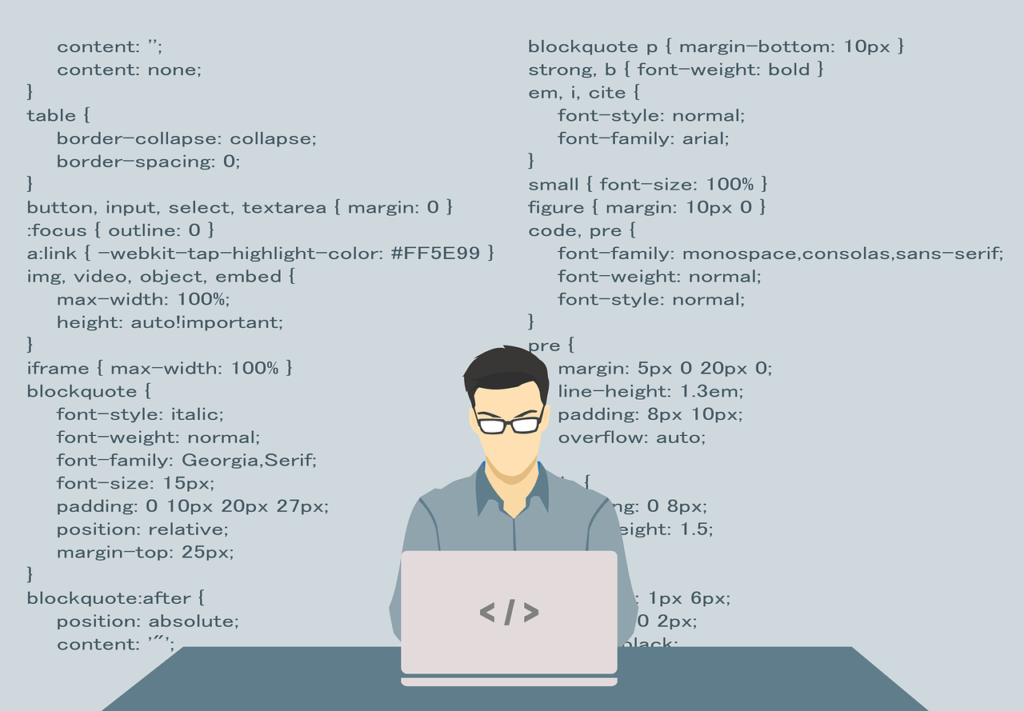In today’s digital world, having a professional website is crucial for any business looking to establish an online presence, attract customers, and drive growth. Your website serves as the virtual storefront of your business, and its design, functionality, and overall user experience can significantly impact your success. A well-designed website not only enhances your brand’s credibility but also provides a platform for engaging with potential customers, generating leads, and ultimately increasing sales.
Choosing the right website development company is a pivotal decision that can influence your business’s online success. The right partner will help you achieve your digital goals, whether that’s building an e-commerce site, creating a content management system (CMS) for easy updates, or designing a brand-focused site that resonates with your target audience. On the other hand, selecting the wrong company can lead to a host of issues including poor design, missed deadlines, and additional costs that could hinder your business’s growth.

This blog aims to guide you through the process of choosing the right website development company by highlighting the critical factors to consider. From understanding your needs and goals to researching potential companies and evaluating their portfolios, we’ll cover all the essential steps to ensure you make an informed decision. By following these guidelines, you’ll be better equipped to select a development partner that aligns with your business objectives and helps you achieve a successful online presence.
Understand Your Needs and Goals
Identify Business Goals
Before you start searching for a website development company, it’s essential to define what you want your website to achieve. Your business goals should drive the design and functionality of your site. Are you looking to generate leads, sell products online, or establish a strong brand presence? Understanding these objectives will help you communicate your needs effectively to potential development partners.
For instance, if your primary goal is lead generation, your website should include features such as contact forms, landing pages, and call-to-action buttons designed to capture visitor information. On the other hand, if you’re focused on e-commerce, you’ll need a platform that supports online transactions, inventory management, and secure payment processing. Identifying your key goals will ensure that the development company you choose has the expertise to build a site that meets your specific needs.
Assess Technical Requirements
Once you’ve identified your business goals, the next step is to assess the technical requirements for your website. There are different types of websites, each requiring distinct approaches and technologies:
- Static Websites: These are straightforward and don’t require much ongoing maintenance. They are suitable for small businesses with a limited amount of content.
- Dynamic Websites: These sites feature content that can change or be updated regularly. They are ideal for businesses that need to frequently update their content or offer personalized user experiences.
- E-commerce Websites: These require robust shopping cart systems, payment gateways, and inventory management features. E-commerce sites are more complex and require specialized development skills.
- CMS-Based Websites: Content Management Systems like WordPress or Drupal allow for easy content updates and management. They are suitable for businesses that want to control their site’s content without needing extensive technical knowledge.
Assessing your technical requirements will help you find a development company with the right skills and experience to handle your project.
Budget Considerations
Establishing a budget is a crucial part of the decision-making process. Your budget will determine the scope of your project and the level of expertise you can afford. It’s important to have a clear understanding of what you can invest in your website development.
Keep in mind that while a higher budget can often result in better quality and more features, it’s not always necessary to spend excessively to achieve a great website. Determine what features are essential for your site and allocate your budget accordingly. Additionally, consider any ongoing costs for maintenance, updates, and potential future enhancements. A transparent discussion about the budget with your potential development partners will help ensure that you receive a proposal that aligns with your financial expectations.
Research and Compile a List of Potential Companies
Sources for Research
The first step in finding the right website development company is to conduct thorough research. Start by using search engines to find companies that specialize in website development. Business directories, such as Clutch, UpCity, or Yelp, can also provide lists of reputable firms along with client reviews and ratings. Additionally, ask for recommendations from business colleagues, friends, or industry peers who may have had positive experiences with web development companies.
When compiling your list, look for companies that have experience working with businesses similar to yours. Their familiarity with your industry can be an advantage, as they will understand your unique needs and challenges.
Evaluate Portfolios
Once you have a list of potential companies, the next step is to evaluate their portfolios. A company’s portfolio showcases their previous work and gives you insight into their design style, technical capabilities, and the types of projects they handle. Review the websites they’ve developed to assess their design quality, functionality, and overall user experience.
Pay attention to the following aspects when reviewing portfolios:
- Design Aesthetics: Look for modern, visually appealing designs that align with current web design trends.
- Functionality: Check if the websites function smoothly and if there are any technical issues or broken links.
- Diversity of Projects: A diverse portfolio indicates that the company can handle various types of projects and adapt to different business needs.
Analyzing these elements will help you gauge whether the company’s style and expertise align with your vision for your website.
Read Reviews and Testimonials
In addition to evaluating portfolios, reading reviews and testimonials from previous clients can provide valuable insights into a company’s reliability and performance. Look for feedback on their communication, project management, and ability to meet deadlines. Platforms like Google Reviews, Trustpilot, and the company’s own website can be useful sources for client testimonials.
When reading reviews, consider both positive and negative feedback. Negative reviews can reveal potential red flags or issues that you may want to address during your selection process. It’s also helpful to contact some of the company’s past clients directly if possible, to get a more detailed understanding of their experiences.
By carefully understanding your needs and goals, researching potential companies, and evaluating their portfolios and client feedback, you can make an informed decision when choosing a website development company. This thorough approach will help ensure that you find a partner who can deliver a high-quality website that meets your business objectives and supports your long-term growth.
Evaluate Technical Expertise and Services
Expertise in Relevant Technologies
When selecting a website development company, one of the most critical factors to consider is their expertise in the technologies and platforms that are relevant to your project. Different types of websites require different technologies, and it’s important to choose a company with experience in the specific technologies that align with your needs.
- Content Management Systems (CMS): For many businesses, a CMS like WordPress, Joomla, or Drupal is essential for managing and updating content easily. If you plan to use a CMS, ensure that the company has substantial experience with your chosen platform. For example, if you opt for WordPress, the company should be proficient in WordPress themes, plugins, and customizations.
- E-Commerce Platforms: If you’re building an online store, platforms like Shopify, Magento, or WooCommerce are popular choices. The development company should have a proven track record with these platforms, including knowledge of integrating payment gateways, managing inventory, and handling secure transactions.
- Custom Development: For unique or complex projects that require custom solutions, ensure the company has experience with custom web development. This might involve programming languages like PHP, Python, or JavaScript, and frameworks such as Laravel, Django, or React. Custom development requires a high level of technical expertise, so it’s crucial to verify the company’s capabilities.
By confirming that the company has the necessary technical skills and experience with the technologies relevant to your project, you can avoid potential issues and ensure that your website will be built to your specifications.
Range of Services
In addition to technical expertise, consider the range of services offered by the website development company. A full-service company can provide a more comprehensive solution for your website needs. Here’s a look at some additional services that might be important:
- Search Engine Optimization (SEO): SEO is crucial for improving your website’s visibility in search engine results. Look for a company that offers SEO services or has experience implementing SEO best practices, such as keyword optimization, meta tags, and quality content.
- Content Creation: Content is a key component of any website. If you need help with creating high-quality content, such as blog posts, product descriptions, or multimedia, choose a company that offers content creation services or has partnerships with content creators.
- Digital Marketing: Beyond the website itself, digital marketing strategies such as social media management, email marketing, and pay-per-click (PPC) advertising can drive traffic and engagement. A company that provides these services can help you develop a holistic online marketing strategy.
- Maintenance and Support: Post-launch support is essential for addressing any issues that arise after your website goes live. Ensure that the company offers ongoing maintenance and support, including updates, security patches, and troubleshooting.
By selecting a company that provides a broad range of services, you can streamline your website development process and ensure that all aspects of your online presence are covered.
Quality of Design and User Experience
The design and user experience (UX) of your website play a crucial role in its effectiveness. A well-designed website not only attracts visitors but also keeps them engaged and encourages them to take action. When evaluating potential development companies, pay attention to the following:
- Design Aesthetics: Review the company’s portfolio to assess its design style and quality. Look for modern, visually appealing designs that align with your brand’s image. A company with a strong design sensibility will ensure that your website looks professional and appealing.
- User Experience: UX encompasses how users interact with your website and how easily they can navigate it. Check if the company’s previous projects prioritize usability, including intuitive navigation, fast loading times, and mobile responsiveness. A good user experience is essential for retaining visitors and reducing bounce rates.
- Accessibility: Ensure that the company considers accessibility standards in its design. An accessible website is usable by people with disabilities and complies with guidelines such as the Web Content Accessibility Guidelines (WCAG).
Evaluating these aspects will help you choose a company that can deliver a website with excellent design and user experience, ultimately contributing to your business’s success.
Consider Communication and Project Management
Communication Channels
Effective communication is crucial for a successful website development project. Evaluate how the company communicates with clients and determine if their methods align with your preferences. Common communication channels include:
- Email: This is a standard method for exchanging information, but it can sometimes lead to delays in response times.
- Phone: Direct phone conversations can facilitate quicker decision-making and problem-solving.
- Project Management Tools: Many companies use project management software like Asana, Trello, or Basecamp to track progress, assign tasks, and share updates. Check if the company uses such tools and if they are comfortable with your preferred method of communication.
Clear and efficient communication will help ensure that your project stays on track and that you remain informed about its progress.
Project Management Approach
Understanding the company’s project management approach will give you insight into how they handle projects and meet deadlines. Look for the following:
- Project Phases: Inquire about their process for dividing the project into phases, such as planning, design, development, testing, and launch. A well-defined project timeline helps ensure that all tasks are completed on schedule.
- Milestones and Deliverables: Check how the company defines project milestones and deliverables. This helps in tracking progress and ensuring that each phase meets your expectations.
- Quality Assurance: Ask about their quality assurance process, including how they test the website for functionality, usability, and performance before launch.
A structured project management approach will help ensure that the project progresses smoothly and that any issues are addressed promptly.
Client Involvement
Determine how involved you will be in the development process. Some companies offer a collaborative approach where clients are actively engaged throughout the project, while others may handle most aspects independently. Consider the following:
- Feedback Process: Understand how the company handles client feedback and revisions. A good development partner will welcome your input and incorporate it effectively.
- Decision-Making: Clarify your role in decision-making and approvals. Ensure that there is a clear process for reviewing and approving design and development work.
- Communication Frequency: Find out how often the company will update you on progress and if there are regular meetings or check-ins.
Choosing a company that aligns with your preferred level of involvement will help ensure that you remain satisfied with the final product.
Review Pricing and Contracts
Pricing Models
Understanding the different pricing models will help you choose a company that fits your budget. Common pricing structures include:
- Fixed Price: This model involves a set price for the entire project. It’s useful for projects with a well-defined scope, as it provides cost certainty.
- Hourly Rate: Some companies charge based on the number of hours worked. This model can be flexible but may result in variable costs depending on the time required.
- Retainer: A retainer involves paying a recurring fee for ongoing services. This is suitable for long-term projects or ongoing maintenance.
Discuss your budget and project requirements with potential companies to determine which pricing model works best for you.
Contract Terms
Reviewing the contract terms is essential to ensure that all aspects of the project are clearly defined. Key elements to consider include:
- Scope of Work: The contract should specify the services included, such as design, development, and testing. Ensure that all deliverables are outlined clearly.
- Timeline and Milestones: Check the project timeline and key milestones. This helps in managing expectations and ensuring that the project stays on track.
- Payment Schedule: Understand the payment terms, including any upfront deposits and payment schedules. Ensure that the terms are fair and align with your budget.
Additional Costs
Be aware of any potential additional costs that may arise. These could include:
- Maintenance and Updates: Some companies charge extra for ongoing maintenance and updates after the website is launched.
- Additional Features: If you request additional features or changes beyond the original scope, there may be additional charges.
- Hosting and Domain: Ensure you understand any costs related to website hosting and domain registration, which may be separate from development fees.
By thoroughly reviewing pricing and contract terms, you can avoid unexpected costs and ensure a clear understanding of what is included in your project.
Choosing the right website development company involves evaluating their technical expertise, range of services, communication and project management practices, and pricing structures. By carefully considering these factors, you can select a partner that aligns with your business goals and helps you achieve a successful online presence.
Check for Post-Launch Support and Maintenance
Support Services
Selecting a website development company isn’t just about the initial design and build; it’s also about the support and maintenance they offer once your website is live. Post-launch support is crucial to ensure your website runs smoothly and remains up-to-date. A reputable company should provide a range of support services, including troubleshooting, bug fixes, and technical assistance. This support ensures that any issues are promptly addressed, minimizing downtime and disruptions to your business operations.
Update Policies
Understanding a company’s policies on updates and maintenance is essential for planning the long-term management of your website. Websites require regular updates to ensure they function correctly and remain secure. Check if the company offers ongoing updates, security patches, and bug fixes as part of their service. Additionally, clarify the frequency of these updates and how they handle emergency issues that may arise. A proactive approach to maintenance can prevent potential problems and ensure your website remains in optimal condition.
Training and Documentation
Managing a website effectively often requires some level of training and documentation. Ensure that the development company provides adequate training for your team on how to use and manage the website. This includes training on content management systems (CMS), e-commerce platforms, or any custom functionalities included in your site. Additionally, request comprehensive documentation that outlines the website’s features, administrative processes, and any specific instructions for maintaining and updating the site. This documentation will be invaluable for your team and can save time and effort in the long run.
Assess Company Culture and Fit
Company Culture
The company culture of your website development partner can significantly impact your working relationship and the overall success of the project. Evaluate whether their company culture aligns with your own values and business practices. A company with a collaborative and client-centric culture is likely to be more responsive to your needs and more invested in delivering a successful project. Look for signs of a positive work environment, such as employee satisfaction, a commitment to professional development, and a client-focused approach.
Client Relationship
Consider how the company builds and maintains relationships with its clients. A good development partner should be committed to understanding your business and its unique needs. Assess their approach to client communication and their willingness to involve you in the development process. A company that values strong client relationships will be more likely to listen to your feedback, address your concerns, and work collaboratively to achieve your goals.
Long-Term Partnership Potential
Think about whether you envision this relationship as a long-term partnership or a one-time project. If you’re looking for ongoing support and future enhancements, choose a company that demonstrates a commitment to long-term relationships. A company that is interested in a long-term partnership will be more invested in understanding your business’s evolving needs and providing continuous support. Conversely, if you view the project as a one-time engagement, ensure that the company is capable of delivering a high-quality product with minimal ongoing involvement.
Ask for References and Case Studies
Request References
One of the best ways to gauge the quality and reliability of a website development company is to speak with their past clients. Request references from the company and reach out to these clients to inquire about their experiences. Ask specific questions about the company’s performance, communication, adherence to deadlines, and how they handled any issues that arose during the project. Honest feedback from previous clients can provide valuable insights into what you can expect from the company.
Review Case Studies
Case studies offer a detailed look into the company’s approach and results for previous projects. Review case studies to understand how the company tackled different challenges, their problem-solving methods, and the outcomes they achieved. Look for case studies that are relevant to your industry or similar in scope to your project. This will help you assess whether their experience aligns with your needs and if they have a proven track record of delivering successful results.
Follow-Up
Don’t hesitate to ask follow-up questions to get a deeper understanding of the company’s capabilities and performance. Inquire about any particular challenges faced in previous projects and how they were overcome. This will give you a clearer picture of the company’s problem-solving skills and its ability to handle unexpected issues.
Test the Company’s Responsiveness and Reliability
Initial Communication
Assess the company’s responsiveness from the very beginning. Evaluate how quickly they respond to your initial inquiries and how effectively they communicate. Timely and clear communication is crucial for a successful project, as it indicates how they will handle ongoing interactions. A company that is prompt and clear in its initial responses is likely to maintain that level of professionalism throughout the project.
Follow-Up
Test their follow-up process by sending additional inquiries or requesting updates on your initial discussions. A reliable company should provide consistent follow-up and keep you informed about the progress of your project. Assess their ability to address follow-up questions and provide detailed responses. Effective follow-up communication is a good indicator of their commitment to customer service and project management.
Reliability
Consider the company’s reputation for meeting deadlines and delivering on promises. Look for reviews or testimonials that mention their reliability and punctuality. A company with a strong track record of meeting deadlines and delivering quality work is more likely to maintain these standards for your project. Reliability is a key factor in ensuring that your project is completed on time and to your satisfaction.
Make Your Decision and Plan for the Future
Decision-Making Process
Once you’ve gathered all the necessary information, it’s time to weigh the pros and cons of each company. Consider factors such as technical expertise, range of services, communication, pricing, and overall fit with your business. Create a comparison chart to visualize the strengths and weaknesses of each option. This will help you make an informed decision and select the company that best aligns with your needs and goals.
Contract Signing
Before finalizing your choice, review and sign the contract carefully. Ensure that all terms and conditions are clear, including the scope of work, deliverables, timelines, and payment schedules. A well-defined contract helps prevent misunderstandings and ensures that both parties have a clear understanding of their responsibilities. If necessary, consult with a legal advisor to ensure that the contract is fair and comprehensive.
Planning for Future Growth
Consider the future growth and scalability of your website. Choose a company that can support future updates, enhancements, and additional features as your business evolves. Discuss your long-term vision for the website and ensure that the development company can accommodate future changes. Planning for growth helps ensure that your website remains relevant and effective as your business expands.

Conclusion
Choosing the right website development company is a critical decision that can impact the success of your online presence. By evaluating factors such as technical expertise, range of services, communication practices, and pricing, you can make an informed choice that aligns with your business needs. Additionally, considering post-launch support, company culture, references, and responsiveness will help ensure a positive working relationship and a successful project outcome.
Final advice: Approach the selection process with a clear understanding of your goals and requirements. Take the time to thoroughly research and evaluate potential companies to find a partner that aligns with your vision and can deliver a high-quality website that supports your business objectives.
Ready to start your search? Use these guidelines to find the perfect website development company for your business and take the first step toward a successful online presence.

